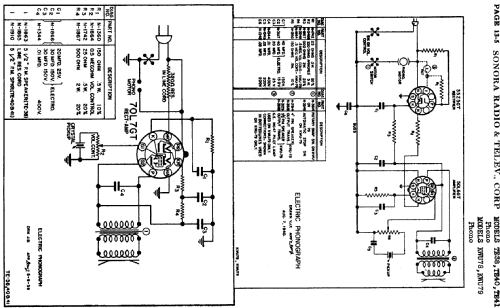TE-38 Duet
Sonora Radio & Telev. Corp.; Chicago (IL)
- País
- Estados Unidos
- Fabricante / Marca
- Sonora Radio & Telev. Corp.; Chicago (IL)
- Año
- 1939/1940
- Categoría
- Registrador o reproductor de sonido o visual
- Radiomuseum.org ID
- 58361
-
- alternative name: Sonora Electric Phono
Haga clic en la miniatura esquemática para solicitarlo como documento gratuito.
- Numero de valvulas
- 1
- Válvulas
- 70L7GT
- Gama de ondas
- - no hay
- Especialidades
- Tocadiscos con ampli. y altavoz
- Tensión de funcionamiento
- Red: Corriente alterna (CA, Inglés = AC) / 115 Volt
- Altavoz
- Altavoz dinámico (de imán permanente) / Ø 5.5 inch = 14 cm
- Material
- Madera
- de Radiomuseum.org
- Modelo: TE-38 Duet - Sonora Radio & Telev. Corp.;
- Forma
- Sobremesa de cualquier forma, detalles no conocidos.
- Ancho, altura, profundidad
- 12.25 x 9.125 x 7.5 inch / 311 x 232 x 191 mm
- Anotaciones
-
Resistance line cord (320 ohm)
- Ext. procedencia de los datos
- Ernst Erb
- Referencia esquema
- Rider's Perpetual, Volume 13 = 1942 and before
- Documentación / Esquemas (3)
- -- Original prospect or advert (The Sonora Folder for 1940.)
- Otros modelos
-
Donde encontrará 344 modelos, 207 con imágenes y 259 con esquemas.
Ir al listado general de Sonora Radio & Telev. Corp.; Chicago (IL)
Colecciones
El modelo TE-38 Duet es parte de las colecciones de los siguientes miembros.
Contribuciones en el Foro acerca de este modelo: Sonora Radio & Telev: TE-38 Duet
Hilos: 1 | Mensajes: 1
It would be nice to replace a 70L7 with a 117V version to eliminate the need for power cord resistor, but when I was looking for a 117V plugin replacement for the 70L7 I found that there was no replacement with the same pinout, and that the 70L7 puts out twice as much power as the 117L7, with the same 110V Bplus.
This is because the 117L7 has a set of curves that works better with a higher impedance and a higher B+. It would be voltage starved in this application. A higher B+ and higher load impedance in the output ransfomer load line shown below, would have increased the possible p-p swing.
The squarer, more tetrode-like set of curves of the 70L7 can fit the lower 2k impedance load line and double the current swing cleanly.
The distinguishing feature of low voltage power pentodes is that they have a lower voltage knee to give more headroom for a wider current swing.
Taking a look at 6L6 high voltage pentode vs 50C5 low voltage pentode confirms this.
In series heater power pentodes, a different heater voltage may mean also a different curve family.
Comments invited,
-Joe Sousa
Joe Sousa, 26.Oct.08














